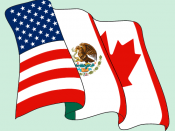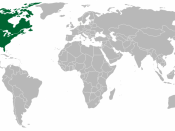As globalization becomes increasingly more evident as countries become further integrated with one another, trade agreements have been formed in recent years to ensure trade opportunities can be gained from. These agreements and trading alliances can be large-scaled such as the global agreement World Trade Organisation (WTO), the smaller scale regional agreements such as the European Union (EU) as well as agreements between two specific countries such as CERTA - Closer Economic Relations Trade Agreement between Australia and New Zealand. They all have the aim of reducing barriers to trade between countries, a process described as trade liberalization.
Trading blocs aid the process of trade liberalization in that it promotes free trade between countries - examples of such groups are the Asia-Pacific Economic Co-operation (APEC) and European Union (EU). Although their arrangements may result in the exclusion of other countries that are not part of their trading bloc, the amount of trade within their groups is significantly a greater percentage than trade outside their bloc - in 2001, APEC's percentage of trade between countries within themselves was 71% of total trade flows.
The countries involved in trading blocs are subjected to signing formal free trade agreements which are designed to minimize protection barriers in the form of tariffs, subsidies and quotas.
A subject of debate is whether trading blocs assist or hinder trade liberalization - preferential trade agreements between countries within a particular block may obstruct our path to global free trade as they divide the global market into separate divisions. However economists agree that trading blocs act as a stepping stone to free global markets, as they remove protective barriers, encouraging countries to open themselves up to free trade - on a smaller scale at first, then later on a global level.
Whilst the European Union tend to have...



Good
your essay is good and directly to th point..i hv made use of it..thank u.. keep it up.
1 out of 1 people found this comment useful.